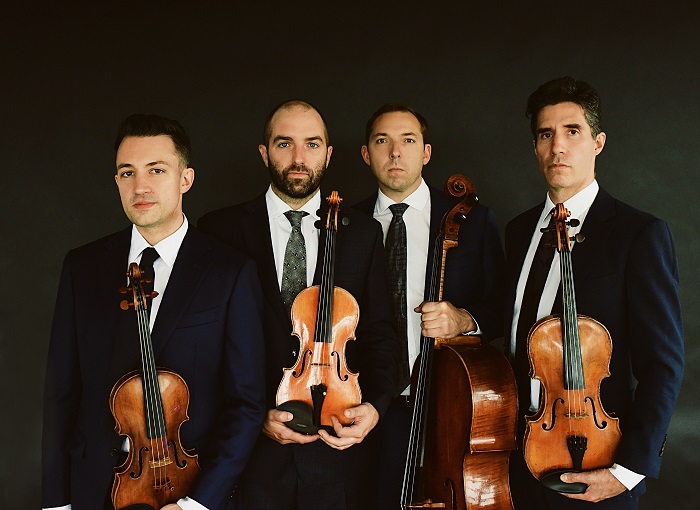Mixed all-Schubert concert by Escher Quartet and Kalish at Wolf Trap

The Escher String Quartet performed Sunday afternoon in the Barns at Wolf Trap.
Concert programs canceled by the coronavirus pandemic are still receiving their “rain date” performances. Some arrive as if through a time warp, stranded as single concerts within unrelated new seasons. Such was the impression left by the recital given by the Escher String Quartet and pianist Gilbert Kalish, heard Sunday afternoon in the Barns at Wolf Trap.
The quartet sounded at their best in the opening work of this all-Schubert program, the Quartettsatz in C Minor. The fleet pacing of this single movement struck the perfect balance between roiling sixteenth notes and serene melodic expression. The agreement among the four musicians on the tempo was so solid that at the repeat of the exposition, no adjustment back to the starting speed was necessary. Likewise the warm tone of the playing impressed uniformly, as the musicians all made way for their colleagues who had lines of interest.
It was an odd bit of programming to include pianist Gilbert Kalish on this program, and then have him play only a solo work and not join for a chamber music piece on the second half. The veteran pianist gave a somewhat tentative rendition of Schubert’s Piano Sonata No. 21, the last work in this genre by Schubert, who died several weeks after completing it. Among minor inconsistencies in the playing, trills, arpeggios, and other challenges posed problems for Kalish.
Kalish, now 87 years old, was the subject of a moving film program shown by Wolf Trap during the pandemic lockdowns. He is a musician of vast experience and sensitivity, on display in this sonata’s slow movement especially, taken at an almost lugubrious tempo. Considerable freedom of rubato smoothed over some difficulties, in the Scherzo and elsewhere, but the results were understated and occasionally profound, but at Schubert’s considerable length (even with the exposition repeat omitted in the first movement), ultimately uninspiring.
Keeping with the autumnal theme, the Escher String Quartet returned to the stage after intermission with Schubert’s String Quartet No. 15, also the composer’s final contribution to a genre. The musicians brought out the luminous qualities of the first movement’s striking opening: major chords that are shaded to minor, like clouds covering the sun. The tone of the four instruments became too strident at the loudest parts, with a warmer sound in the softer second theme. Although second violinist Brendan Speltz was often overshadowed, violist Pierre LaPointe stood out for his lush lines.
First violinist Adam Barnett-Hart, the other remaining founding member along with LaPointe, made his most attractive sounds floating dulcet lines. The recapitulation of the first movement, where the opening motif of major-to-minor chords is reversed, shone radiantly. Cellist Brook Speltz, brother of the second violinist, excelled in his prominent solo role in the second movement, a soft, plaintive melody supported by a whispered accompaniment.
The third movement proved to be the high point, a lively Scherzo played with a light approach that doubled down on the devilishness while astutely observing Schubert’s pianissimo dynamic markings. None of the rough side of the quartet’s sound appeared here, with the slower Trio lilting in a tender dance, again featuring the cello in the lead.
The group lunged into the Finale with gusto, although at a tempo that not only unsettled the ensemble cohesion but pushed the instruments, especially the first violin, into stridency of tone. This was excitement of the sort that can make the listener apprehensive rather than providing a thrill. Long stretches of the viola part in this movement involve the pulsating repetition of a single note. Twice during the movement, LaPointe coolly kept playing that figure on an open string, while using his now free left hand to make a complicated page turn.
Wu Han, Anna Geniushene, and Dmytro Choni perform pieces for two pianos by Rachmaninoff, Tchaikovsky, and Scriabin 3 p.m. February 19. wolftrap.org




Posted Jan 23, 2023 at 1:34 pm by Becky Cromwell
I love the Schubert Piano Sonata and was very excited to hear it played in this setting. I also share the reviewer’s feeing that the arrangement of the three pieces was a bit odd. (having the Quartetszat first, then the sonata, then the final quartet.)
I was also disappointed that Kalish seemed tentative (my word was “not in control”). I’m very sensitive to the age issue — after all, he is 87. I saw Rubinstein when he was in his 80’s and there mistakes, but overall he seemed to be performing with energy and emotion. But it is a let-down when a performer is not playing at the regular level.
Posted Jan 30, 2023 at 5:42 pm by TImothy Kendall
Was there ever a time when Rubinstein’s playing was not mistake-laden? I only saw him 2-3 times; he was definitely one of my “minor gods”, one of the most poetic players I can remember, and it seemed that no one cared about the mistakes because of exactly the “energy and emotion” you mention. But periodically he would plunk something down that made you wonder if it weren’t on purpose. “Here’s a new chord you’ve never heard of before! Hah!”
Speaking of age, it seems to me that he’d signed a contract that would have had him playing on his 100th birthday, if he’d lived that long. He missed it by about 5 years, but was blind by the time he retired, so who knows …